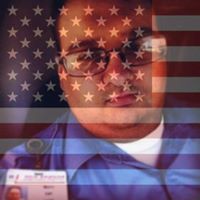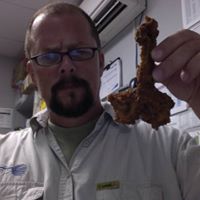Leaderboard
Popular Content
Showing content with the highest reputation on 06/12/2013 in all areas
-
1 point
-
1 point
-
I completely understand where you all are coming from. I was thinking the same thing, and I by no means would put myself in a position where I would jeopardize the safety of myself, a partner, or a patient. I can't say what I can hear as being on an ambulance is a different circumstance than everyday life- there's sirens and the fact that you can't read your partner's lips (that would be way too dangerous to do while driving, of course). However, I believe that I would hear a fight going on in the background or if my partner needed me. On top of that, technology is improving so much that I can filter out sounds to focus on a voice or raise the volume to hear a soft whisper. My plan is to continue working hard in speech therapy (it helps my hearing as well) and hope for the best- and when the time comes, if my hearing is good enough, I will go for it But, if I feel that I am in any way incapable of giving 100% quality care, I'll shoot for a career in the ER. Thank to everyone for being so respectful about this issue- I appreciate it!1 point
-
Isn't it a pity that we focus on "can this guy hear?" instead of "does this yahoo have a brain that works?" If we're talking about folks to exclude from playing due to risk of missing something or not being able to provide good care, I'd much rather let someone with a hearing impairment (not full deaf, mind you- you have to be able to hear enough to assess) work on me and mine than some asshat who doesn't care about the medicine and worse, doesn't care to learn. You can hear abnormal breath sounds... but do you know what to do with them? Let's say you can hear well enough to hear they're abnormal, but not exactly what's wrong. You smack your partner, throw them your steth and say "check me here- what are you hearing?" How is that any different than what a lot of us do- "hey man, I've got something here and I'm not totally sure of it- what do you see/hear?" I would think that someone who is partially deaf knows that they are at a disadvantage when it comes to situational awareness and would be working harder to make sure they're as close to "on the same page" as everyone else... now, if someone is full deaf, that's a different story... not only can they not assess, but they're not able to ensure their own safety, let alone someone else's. Before anyone says I'm being prejudiced, let me just explain that whitewater rafting with my cousin (who has to put her cochlear in the dry bag so it doesn't get fried) means watching out for her at least sevenfold compared to the rest of the folks in the boat. She can't hear instructions and needs a hearing partner to pull her down, get her to duck, change paddle directions, etc... when she got pitched, that was terrifying, because she couldn't hear our instructions. Now, am I willing to take the responsibility for keeping her safe when we're out rafting? Absolutely- she's a good swimmer, and does decently despite the deficit. Am I willing to take responsibility for a full deaf partner who has to have me do any hearing based assessments, radio comms, and maintain full situational awareness for all of us? Man, that's a tough one. They better be one hell of a clinician despite the deficit. If they have the attitude of entitlement that I've seen some folks with disabilities or disadvantages have, they're surely not welcome. Knowing you have a deficit and working hard to overcome it and prove your capabilities is excellent; expecting everyone else to accommodate you by default because you have XYZ is wrong. I don't expect my coworkers to pick up the slack when say, I have an asthma attack in the middle of my busy shift... just because I'm asthmatic. I don't expect to get an easier patient assignment. I feel bad, rather than entitled, when said situation above happens and I have to pass all my patients off in the middle of an already fubar shift... if I were an entitlement brat, I'd just take it for granted. Instead, I'm truly grateful... Wendy CO EMT-B RN-ADN1 point
-
Hi all, I wrote the below post in my blog and was curious about your thoughts. The idea from it actually came from a discussion of FB. Some saying that compassion, and/or "hand holding" is part of EMS, like me, and others saying that it can be, but that it's not necessary to do good medicine. Anyway, the below isn't directly regarding that, but it's what got the ball rolling in my head.. From, www.chasing-my-life.com Let’s talk about the spirit of EMS for a minute… June 4, 2013by Dwayne Let’s talk about wankers first. (wackers, wannabes, Ricky Rescues, whatever). I’ll start. They hurt my heart. Truly. And they also, without knowing it, hurt their own hearts as well. And probably worse, they hurt the spirit of EMS very much. I believe that there is an amazing spirit that lives at the very heart of EMS. If we listen to it, it can make EMS the most amazingly rewarding career that I can imagine. If we don’t, then we can sometimes end up being just another wanker that’s been given a truck with lights and a siren. And I’m not a big fan of the wankers. They just don’t ‘get it.’ We’ve worked hard for the privilege of being “the” person that people call when they are terrified. The person called when they, or someone that they love, are hurt, or ill, or sometimes just mentally or emotionally lost. Yet somehow there seems to be a huge segment of the EMS population that has decided to whine about that. To complain about the fact that they’ve been asked to actually perform in the role that they’ve worked towards and applied for. They’ve decided that to be cool you have to show how detached you are from compassion and simple human decency. Fortunately, I believe that most of us don’t fit into that category. And most that do don’t want to, they are just not strong enough yet to go against their buddies that choose to act cool instead of being competent. Let me lay out a few guidelines regarding our EMS spirit, yours and mine. If you’ve transported an old person and later referred to them as a ‘lizard’ or ‘gomer’, you’re a wanker. If you’ve bragged about how much you love the sound of breaking ribs during CPR, you’re a wanker. If you’ve ever explained to someone how you’d love to give your most recent suicide attempt (real or pretended) better instructions so that they can be successful in the future, you’re a wanker. If you’ve ever chosen to leave a patient’s spirit in worse shape than when you found it, in any way, you’re a wanker. Those gomers and lizards have lived a long time, and have accomplished things that you can’t possibly imagine. They’ve lived through a world war, some of them more than one, and multiple depressions, including the Great One. They’ve watched their friends, brothers, sisters, and too often, their children die. They’ve been humiliated as their driver’s licenses have been taken from them, again as their bladders and bowels began to betray them, and in many, many cases they were forcefully removed from their homes and placed in terrible institutions against their will, by the children that they raised. They now live in a world that many of them don’t understand, are afraid, feel unwell, and are powerless. They deserve, and have unquestionably earned more than our county gives them, but at the very least they deserve our respect and very best care. Those breaking ribs belong to a human being that is almost certainly in the last seconds of their life. Trillions and trillions of memories, loves, tears, laughter, all ending at that moment. The cracking sound that you’re so proud of will be heard, very often, by their families and loved ones. It’s that sound that they will involuntarily associate with the last memory of their mom, dad, or child, for the rest of their lives. Sometimes these worn, tired, amazing people need help. They need a hero. So they call for an ambulance. If you’re a wanker, unfortunately they sometimes get you instead. You laugh about the smell of their rooms, make jokes about their diapers, the way they talk, the way they chew, draw pictures of their sagging breasts. You drop them off at the hospital and then go to the bar later, strutting, wearing your EMS or firefighter t-shirt, accepting accolades for all of the amazingly heroic things that you did with your day, though no heroic things were done. Accept free drinks for being willing to put your life on the line during every shift!! Wanker bullshit at it’s finest. If you’re a wanker, you have the opportunity on these calls to be a hero. But as there were no burning buildings, or bullets to dodge, no cameras around to put your face in the paper, you couldn’t be bothered. You had the ability to ‘see’ this tired old person. To get them to tell you their stories, and truly listen to them. To get them an extra blanket even if they didn’t need one, simply to show them that they were still important. More important, you had the opportunity to stand up for them after the call. To choose to promote their dignity instead of joining your buddies in crowing about their uselessness. During each call we have a chance to make a difference in someone’s spirit, and therefore their life. After each call we have a chance to make a difference in EMS. And please, if you’re a wanker, spare me the argument of, “I may say those things after a call, but that doesn’t effect my patient care!” Bullshit again. In fact, if I even have to explain this to you then you’ve likely deluded yourself so completely that I’m not sure that you’re reachable at this point. Do our attempts to make a difference always work? No, almost never. Do they sometimes create drastic change? Yes. Do they ALWAYS make some positive difference in our patient, and just as important, in us? Yes, they do. Every, single, time. Is there ever a good reason NOT to try? One. If you’ve got a dozen plates spinning, trying to save a life, then perhaps you don’t have time for this type of compassion. But as soon as one of those plates is taken down? You’re out of excuses again. Besides, despite what you allow your family and girlfriend/boyfriend to believe, those are what? 1/10 of 1% of your calls? Maybe your attempt at some positive thing does something, or maybe it doesn’t, or maybe it does but you won’t be there to see it at some later date. Any way you slice it, succeed or fail, making the attempt is just simply good medicine. Language is powerful. Each time we use, or hear such terms as those above it should make us feel a bit ill. You know that feeling. When you’ve discovered that you pushed the wrong drug, or the wrong dose? Or delivered a medication before finding that you forgot to consider interactions with the other drugs they’re already taking? That ill feeling that you get when you know that you’ve done bad. That you were called to help, but hurt instead. Wanker or not, I’m confident that you know what I mean. I certainly know that feeling well. I know that you went into this wanting to be a champion for those that can’t champion for themselves. I know, I truly believe, that you went into this to make a difference. I know that at the end of the day that you want to lay your head down knowing that someone’s life is better because you were a part of it when they were in trouble. Please. Listen to your EMS spirit. Take a minute on every call and actually see your patients beyond their pathologies. Treat their bodies, but heal their minds and spirits. If you’re not doing so then you’re missing a vital part of the medical arts. It costs nothing but an additional bit of your focus. It takes no additional time. But the rewards are monumental. Leave the wankers to do what wankers will do. But today, choose not to participate. Will the world change because you’ve made a different decision? Yes, for this one person, their families, and friends, the world will be different. It should feel like a privilege to hold such power as to be able to be part of a stranger's memories for the rest of their lives. Those memories will be good or bad, either way those that carry them will be changed. To the professionals in EMS that get the reason, and the need for such posts…I salute you. Thank you for watching out for my family and myself. For bringing the best of EMS to every home, and to every patient. I promise to continue to do, every day, the best I can to be considered your peer and to live up to your example. To those of you that think that this is just a bunch of feel good rah, rah, bullshit. I thank you to, for the work that you do, though I’ll likely never consider you a professional. My wish for you is that you to take a minute to think, and go back to the days when you could be proud of the job that you do every day. When you do? Man, nothing would make me happier than to welcome you to the ranks of the brotherhood of professional EMS providers and scratch another name off of the wanker list. To those of you that really don’t know what the hell this is all about? That’s ok… You will. And as you move forward maybe this will give you a bit of a compass to help guide your way. I hope so. I’ll keep an eye out for you down the road… Have a great day all…1 point



